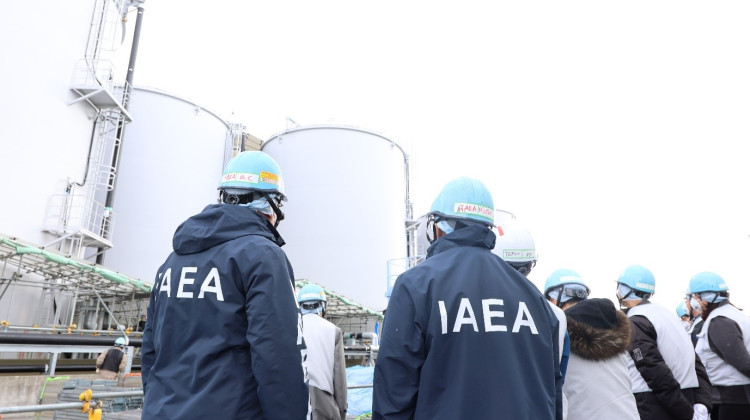The discharge of the ALPS (Advanced Liquid Processing System) treated water from Japan's Fukushima Daiichi Nuclear Power Station (FDNPS) is progressing in line with international safety standards, the Task Force set up by the International Atomic Energy Agency (IAEA) confirmed this week following its latest four-day mission to Japan.
From December 9 to 12, the Task Force conducted a mission to evaluate the technical aspects of the ALPS treated water release, including an on-site inspection of the facilities used for the discharge at the FDNPS.
Accompanied by TEPCO staff, the Task Force performed a walkdown of the water tanks used in the discharge process, as well as the emergency isolation valves, the sea water dilution system and the radiation monitors and flow rate detectors which feed live data to the IAEA’s dedicated real time monitoring page.
This week marks the third mission of the Task Force to Japan since the start of the ALPS treated water releases on 24 August 2023. Since the beginning of the IAEA’s multiyear review that began two years before the water release, the Task Force has carried out eight missions. In the IAEA Comprehensive Report on the Safety Review of the ALPS-Treated Water at the Fukushima Daiichi Nuclear Power Station that was released prior to the discharge, the IAEA found Japan’s approach to discharging the treated water to be consistent with international safety standards. It also confirmed that the results of the radiological environmental impact assessment performed by Tokyo Electric Power Company (TEPCO) – operator of the plant - and the Government of Japan showed that the release as planned would have a negligible radiological impact to people and the environment.
As part of the comprehensive report, the Task Force – comprised of IAEA and 11 international experts from Argentina, Australia, Canada, China, France, the Marshall Islands, the Republic of Korea, the Russian Federation, the United Kingdom, the United States and Viet Nam - set out the topics that it would review during the discharge of the ALPS treated water.
Whilst visiting the plant on 11 December, the Task Force also engaged in technical discussions with TEPCO with reference to available source and environmental monitoring data and operational experience. The IAEA has experts stationed at FDNPS since July last year when Director General Rafael Mariano Grossi established an IAEA office there. The IAEA’s onsite laboratory has analysed the first ten discharges that occurred from August 2023 to October this year and have confirmed the tritium concentration in each batch of the ALPS treated water released to date is far below Japan’s operational limit.
During the four-day mission, the Task Force also spoke to officials from the Nuclear Regulation Authority (NRA) to gather updates on technical topics important for safety. In Tokyo, it met with Japan’s Ministry of Foreign Affairs (MOFA) and Ministry of Economy, Trade and Industry (METI).
Gustavo Caruso, Chair of the Task Force, said, "The Task Force missions ensure that we stay updated on the ALPS treated water release and directly observe the status of the discharges. We confirm that the release continues to comply with international safety standards, and we remain committed to ongoing assessments to ensure this remains the case in the future."
The main outcomes from the Task Force’s mission this week will be summarized in a report to be made publicly available early next year. The reports on the first two review missions held by the Task Force since the start of the water releases are available online.


